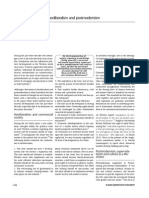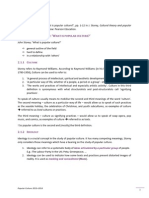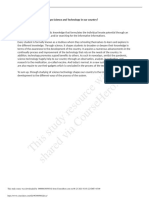MIT 1050 - Week 4
MIT 1050 - Week 4
Uploaded by
Mar JoCopyright:
Available Formats
MIT 1050 - Week 4
MIT 1050 - Week 4
Uploaded by
Mar JoOriginal Description:
Copyright
Available Formats
Share this document
Did you find this document useful?
Is this content inappropriate?
Copyright:
Available Formats
MIT 1050 - Week 4
MIT 1050 - Week 4
Uploaded by
Mar JoCopyright:
Available Formats
MIT 1050: Week 4
Power
Power as force:
o Embedded in institutions such as government: the government has power over
citizens of a country and province. That power is backed up by law and the legal
system.
o Military: the military symbolizes national power and the means of protecting
and securing the nation.
o Government power backed up by laws and legal system: the government and
its laws hold out the threat of punishment if necessary to restore order and to
keep civil society functioning. Issuing a parking ticket is a form of power as force,
to remind us that we can only rent a space for a short time or face a penalty if
we exceed it.
o Police: the police enforce the laws on a more local basis.
o What they all have in common is the threat of punishment. That threat may be
physical, as in the power of the military and the police to deploy violence if
necessary, to “keep the peace.”
Power as the force of ideas
o Media Studies views power as the force of ideas. Power is not just “the
government” or the “legal system” or “the police” or even “the professor”.
Power is in the ideas that form the “commonsense” of everyday life, the
“cultural commonsense”, we take these for granted.
Media and Power
o Super-sized conglomerates control much of the production, distribution, and
exhibition of the world’s media. The content produced by these companies
circulates and reproduces cultural commonsense. They help to naturalize
concepts that are not natural. Media represents ideas, groups, identities and
more in ways that both create and reaffirm cultural commonsense, making what
are actually what I will call cultural constructions seem natural and “real”.
Media are Powerful – Media representations of the world can often stand in for reality,
that is, we can get our view of reality from the media we consumer. “Mean world
syndrome” is the idea that television new and other programming depicts the world as
much more dangerous than it really is.
Media Make People Powerful.
Media are agents of power.
Media and Ideology
What is ideology?
o Ideology is a key, if not the key, concept used in critical approaches to the media.
o A way of thinking about the world that emerges from and reinforces a speicifc
social order.
o Assumes that societies are structure by economic, cultural, and political systems
that separate people according to their position in that system.
o Systems work to privilege certain group at the expense of others.
o Distribute power, resources, and status unevenly.
o Set of dominant cultural values, ideas, and beliefs.
o At a basic level, ideology is a set of shared ideas that appear natural. The cultural
commonsense, discussed in Part 1, reflect and supports the dominant ideology in
a given culture at a given time.
What does ideology do?
o To examine ideology is to examine how the ideas, assumptions, and logics
through which we make sense of reality and live in the world. Ideology is a
concept and not a thing that we can look at or hold in our hands. We can see
ideology at work in the media, through who and what is valued, the types of
stories told and ideas circulated, and what is made to seem important and what
isn’t.
o Helps us make sense of reality.
o Justify and reproduces systems like capitalism, patriarchy, heteronormativity,
ableism, or white supremacy.
o Makes unequal social relations that are culturally constructed seem natural.
Dominant Ideology
o The media that we consume helps to make the dominant ideology invisible to us.
In that way, the ideas that support that ideology are maintained. Ideology is an
abstraction, but the dominant ideology of an era has a strong impact on how
societies are structured and the systems that support that structure. When most
successful, a dominant ideology makes the way a society operated appear
inescapable, even when its isn’t and makes it difficult to imagine how else our
society could order.
o A web of beliefs that underpins a specific system of domination at specific
moments.
o Makes highly politicized ways of seeing and living in the world seem natural.
o Makes certain social arrangements, practices, and behavior that promote the
interest of some over other appear natural.
o Makes the way that society operates seem inevitable.
Media as agents of power – media has a large role in reinforcing systems that support a
specific social order. They support the capitalist system – that is, they make a lot of
money. They also circulate myths that support other cultural systems.
Ideology is reproduced in and by media.
Why are some ideas so tenacious over time? – Much has changed since the 1950’s, yet
some remains the same.
Critical Approaches
Marxism
o The first, and the basis for several others, is Marxism. Marx did his studies in the
mid-1800s, at the height of the Industrial Revolution. Marx predicted that the
proletariat would eventually revolt, but in most of the world they did not.
Capitalism is still very much with us, through World Wars, political revolutions,
major economic depressions and recessions, and periods of upheaval that could
have resulted in major changes to the economic base of society.
o Critique of capitalism
o Capitalism characterized by a small but powerful class group, the bourgeoisie,
and the exploitation of non-wealthy proletariat.
o The superstructure (culture, politics, ideas) reflects the base (economic
relations/mode of production).
o Capitalist economic relations are accompanied by a corresponding set of
dominant values.
o Ideology promotes false consciousness.
Critical Theory
o Frankfurt school.
o Human reified – reduced objects under capitalism.
o Instrumentalism – focus on efficiency, profit and control – suffocates creativity,
critical thought, human subjectivity.
o Cultural industry turns art into a mass commodity.
o Consumption of mass-produced products distract people from their oppression
under capitalism.
o Products of the culture industries standardized and pseudo-individualized.
Antonio Gramsci
o Theory of cultural hegemony: the give and take between those who hold power
and those under power.
o Civil sphere is where social life is ordered and reproduced.
o Dominant group must retain hegemony over the realm of culture and ideas.
o The realm of culture and ideas is a site of active struggle for influence.
o Intellectuals play a crucial role in challenging and changing dominant ideas.
o Media as sites of struggle over meaning.
Louis Althusser
o Althusser theorized the role of institutions such as church, the family, and school
reproduced subjects, that is, us, who believed that their position in the social
structure was natural.
o Ideological State Apparatuses (ISA’s)
o Interpellation: ideology controls how we think about ourselves.
o Media as an ISA: provides views of the world that benefit the powerful.
Cultural Studies
o The work of Gramsci, Althusser and other opened up some gaps in the strict
Marxist model of the economic base dictating everything in the superstructure.
Cultural Studies, which emerged as a neo-Marxist school of thought in the
1960’s, a foundation of the culturalism approach to media studies. Stuart Hall, is
acknowledged as one of the founders and key thinkers of Cultural Studies. Hall
was particularly interest in how cultural struggles played out through the media.
He and other cultural studies scholars recognize that consumers or audience
groups may not accept all of the messaged encoded into media tests. That is
audiences are not cultural dupes. Cultural studies focus upon popular culture,
particularly media texts, as sites of struggle over cultural meaning.
Michel Foucault
o Historian, philosopher, psychology. Developed different model of power that
while scary, also provides ways to explore how power works. Foucault’s work
had a major influence on feminist studies, gender studies, critical race studies,
media studies, etc.
o Truth is produced by power.
o Each society has its own “truth discourse” such as religion, science, etc. which
presupposes social power relationships.
o Power not hierarchical but networked
o Power is productive
o Power/Knowledge
o No objective truth but “truth effects”
o “Regimes of truth”
o If power, then resistance
o Discourse and discursive formations
o Power as web that we can never get outside of. We reproduce power by
disciplining ourselves, our bodies and our minds according to unwritten rules
that we feel compelled to follow. Media has a role in circulating those rules.
o Discursive formations are sets of practices and languages that produce ways that
we think about things. Media is a key tool.
You might also like
- Values, Lifestyles, and Ideology in MediaNo ratings yetValues, Lifestyles, and Ideology in Media22 pages
- Introduction To Cultural Studies Part IINo ratings yetIntroduction To Cultural Studies Part II19 pages
- Introduction To Cultural Studies Part IINo ratings yetIntroduction To Cultural Studies Part II19 pages
- Definition of Terms Ideologies Weeks1 3No ratings yetDefinition of Terms Ideologies Weeks1 330 pages
- 1.2 Social Control, Conformity and Resistance- List of ReferencesNo ratings yet1.2 Social Control, Conformity and Resistance- List of References5 pages
- Lecture 1 The Constitution of The SocietyNo ratings yetLecture 1 The Constitution of The Society45 pages
- Popular Culture Chapter 02: Popular Culture100% (3)Popular Culture Chapter 02: Popular Culture10 pages
- Emergence of Critical & Cultural Theories in Mass Communication100% (3)Emergence of Critical & Cultural Theories in Mass Communication6 pages
- Political Ideologies I: GVPT 100 SEPTEMBER 24, 2007No ratings yetPolitical Ideologies I: GVPT 100 SEPTEMBER 24, 200741 pages
- The Major Social Science Theories Hand OutsNo ratings yetThe Major Social Science Theories Hand Outs11 pages
- 2024 Communication Foundations Final Exam Study GuideNo ratings yet2024 Communication Foundations Final Exam Study Guide34 pages
- Concept of Power Hegemony, Ideology, Legitimacy.No ratings yetConcept of Power Hegemony, Ideology, Legitimacy.32 pages
- Introduction To Understanding Culture, Society and Politics100% (1)Introduction To Understanding Culture, Society and Politics27 pages
- Classical Sociological Theory: by Chrissi KeoghNo ratings yetClassical Sociological Theory: by Chrissi Keogh61 pages
- Summary: Intellectuals and Society: Review and Analysis of Thomas Sowell's BookFrom EverandSummary: Intellectuals and Society: Review and Analysis of Thomas Sowell's BookNo ratings yet
- Class+8+ Chapter+8 +Practice+Questions+ ANSWERSNo ratings yetClass+8+ Chapter+8 +Practice+Questions+ ANSWERS4 pages
- MIT 1050: Week 2: Overview of Media IndustriesNo ratings yetMIT 1050: Week 2: Overview of Media Industries3 pages
- [Ebooks PDF] download Complementary and Alternative Medicine Caragh Brosnan full chapters100% (1)[Ebooks PDF] download Complementary and Alternative Medicine Caragh Brosnan full chapters55 pages
- Group 9-INTERGRATING BIG DATA ANALYSTIC IN NURSINGNo ratings yetGroup 9-INTERGRATING BIG DATA ANALYSTIC IN NURSING10 pages
- Measuring Acceptance and Acceptability of ITS: Theoretical Background in The Development of A Unified ConceptNo ratings yetMeasuring Acceptance and Acceptability of ITS: Theoretical Background in The Development of A Unified Concept19 pages
- t2 M 1382b Converting Centimetres Metres and Millimetres Worksheet - ks2 Resource Editable - Ver - 2No ratings yett2 M 1382b Converting Centimetres Metres and Millimetres Worksheet - ks2 Resource Editable - Ver - 26 pages
- Memo For FOs I-XII, NCR, CAR and CARAGA Re Survey On The Usage, Attitude, and Image Study On STB and Its ProgramsNo ratings yetMemo For FOs I-XII, NCR, CAR and CARAGA Re Survey On The Usage, Attitude, and Image Study On STB and Its Programs9 pages
- Bioinformatics Computing II: Introduction To Natural ComputingNo ratings yetBioinformatics Computing II: Introduction To Natural Computing9 pages
- Nature of Project Based and Problem-Based Approaches in100% (3)Nature of Project Based and Problem-Based Approaches in14 pages
- Emotion and Cognition Aging and The Positivity EffectNo ratings yetEmotion and Cognition Aging and The Positivity Effect6 pages
- Describe The Concept of Gender and Sex Recognize The Difference Between Gender and Sex Explain The Terms Gender DynamicsNo ratings yetDescribe The Concept of Gender and Sex Recognize The Difference Between Gender and Sex Explain The Terms Gender Dynamics4 pages
- Session Plan-6-Deal With or Handle Intoxicated Guests50% (2)Session Plan-6-Deal With or Handle Intoxicated Guests2 pages
- Gujarat Technological University Sankalchand Patel College of Engineering, Visnagar Question BankNo ratings yetGujarat Technological University Sankalchand Patel College of Engineering, Visnagar Question Bank2 pages
- Tartaron 2003 The Archaeological SurveyNo ratings yetTartaron 2003 The Archaeological Survey24 pages
- PR1 - Lesson 6 - Sample and Sampling TechniquesNo ratings yetPR1 - Lesson 6 - Sample and Sampling Techniques2 pages
- This Study Resource Was: How Does School Science Shape Science and Technology in Our Country?80% (5)This Study Resource Was: How Does School Science Shape Science and Technology in Our Country?1 page
- 1.2 Social Control, Conformity and Resistance- List of References1.2 Social Control, Conformity and Resistance- List of References
- Emergence of Critical & Cultural Theories in Mass CommunicationEmergence of Critical & Cultural Theories in Mass Communication
- Political Ideologies I: GVPT 100 SEPTEMBER 24, 2007Political Ideologies I: GVPT 100 SEPTEMBER 24, 2007
- 2024 Communication Foundations Final Exam Study Guide2024 Communication Foundations Final Exam Study Guide
- Introduction To Understanding Culture, Society and PoliticsIntroduction To Understanding Culture, Society and Politics
- Summary: Intellectuals and Society: Review and Analysis of Thomas Sowell's BookFrom EverandSummary: Intellectuals and Society: Review and Analysis of Thomas Sowell's Book
- [Ebooks PDF] download Complementary and Alternative Medicine Caragh Brosnan full chapters[Ebooks PDF] download Complementary and Alternative Medicine Caragh Brosnan full chapters
- Group 9-INTERGRATING BIG DATA ANALYSTIC IN NURSINGGroup 9-INTERGRATING BIG DATA ANALYSTIC IN NURSING
- Measuring Acceptance and Acceptability of ITS: Theoretical Background in The Development of A Unified ConceptMeasuring Acceptance and Acceptability of ITS: Theoretical Background in The Development of A Unified Concept
- t2 M 1382b Converting Centimetres Metres and Millimetres Worksheet - ks2 Resource Editable - Ver - 2t2 M 1382b Converting Centimetres Metres and Millimetres Worksheet - ks2 Resource Editable - Ver - 2
- Memo For FOs I-XII, NCR, CAR and CARAGA Re Survey On The Usage, Attitude, and Image Study On STB and Its ProgramsMemo For FOs I-XII, NCR, CAR and CARAGA Re Survey On The Usage, Attitude, and Image Study On STB and Its Programs
- Bioinformatics Computing II: Introduction To Natural ComputingBioinformatics Computing II: Introduction To Natural Computing
- Nature of Project Based and Problem-Based Approaches inNature of Project Based and Problem-Based Approaches in
- Emotion and Cognition Aging and The Positivity EffectEmotion and Cognition Aging and The Positivity Effect
- Describe The Concept of Gender and Sex Recognize The Difference Between Gender and Sex Explain The Terms Gender DynamicsDescribe The Concept of Gender and Sex Recognize The Difference Between Gender and Sex Explain The Terms Gender Dynamics
- Session Plan-6-Deal With or Handle Intoxicated GuestsSession Plan-6-Deal With or Handle Intoxicated Guests
- Gujarat Technological University Sankalchand Patel College of Engineering, Visnagar Question BankGujarat Technological University Sankalchand Patel College of Engineering, Visnagar Question Bank
- This Study Resource Was: How Does School Science Shape Science and Technology in Our Country?This Study Resource Was: How Does School Science Shape Science and Technology in Our Country?






























































































